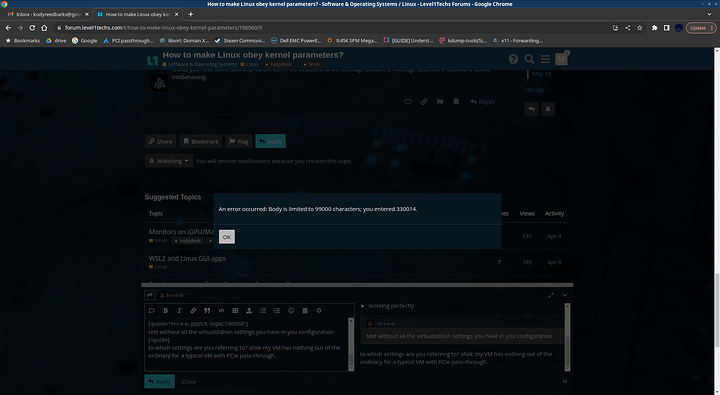My kernel keeps fucking with the pcie max payload size even though I’ve specified pci=pcie_bus_tune_off.
I have confirmed in grub AND /proc/cmdline that the parameter IS being passed to the kernel, yet I get payload size reductions anyways. This kills my system performance and is unacceptable.
This is a libvirt VM.
Rebooting the VM over and over again, while changing absolutely nothing, until this fuckery just goes away on its own is the only way to make the system usable.
I’ve had this issue for a while but just recently learned it’s related to these “payload” thingies. Should be fixed if this payload system were disabled entirely, but this VM’s kernel is ignoring the parameter and screwing with it anyways. Only sometimes. Rebooting the VM repeatedly will reliably eventually produce a state where this behavior is not present and everything runs as it’s supposed to.
How do I force the kernel to ALWAYS obey my parameters? Instead of at complete random, being decided at VM kernel load, as in my current setup?
VM XML
<domain type='kvm' id='2'>
<name>TESSA1</name>
<uuid>50ec8055-258b-47e0-a20f-7730cf37c879</uuid>
<memory unit='KiB'>33554432</memory>
<currentMemory unit='KiB'>33554432</currentMemory>
<memoryBacking>
<nosharepages/>
<locked/>
</memoryBacking>
<vcpu placement='static'>12</vcpu>
<cputune>
<vcpupin vcpu='0' cpuset='8'/>
<vcpupin vcpu='1' cpuset='24'/>
<vcpupin vcpu='2' cpuset='9'/>
<vcpupin vcpu='3' cpuset='25'/>
<vcpupin vcpu='4' cpuset='10'/>
<vcpupin vcpu='5' cpuset='26'/>
<vcpupin vcpu='6' cpuset='11'/>
<vcpupin vcpu='7' cpuset='27'/>
<vcpupin vcpu='8' cpuset='12'/>
<vcpupin vcpu='9' cpuset='28'/>
<vcpupin vcpu='10' cpuset='13'/>
<vcpupin vcpu='11' cpuset='29'/>
<emulatorsched scheduler='fifo' priority='1'/>
<vcpusched vcpus='0' scheduler='fifo' priority='1'/>
<vcpusched vcpus='1' scheduler='fifo' priority='1'/>
<vcpusched vcpus='2' scheduler='fifo' priority='1'/>
<vcpusched vcpus='3' scheduler='fifo' priority='1'/>
<vcpusched vcpus='4' scheduler='fifo' priority='1'/>
<vcpusched vcpus='5' scheduler='fifo' priority='1'/>
<vcpusched vcpus='6' scheduler='fifo' priority='1'/>
<vcpusched vcpus='7' scheduler='fifo' priority='1'/>
<vcpusched vcpus='8' scheduler='fifo' priority='1'/>
<vcpusched vcpus='9' scheduler='fifo' priority='1'/>
<vcpusched vcpus='10' scheduler='fifo' priority='1'/>
<vcpusched vcpus='11' scheduler='fifo' priority='1'/>
</cputune>
<numatune>
<memory mode='strict' nodeset='1'/>
</numatune>
<resource>
<partition>/machine</partition>
</resource>
<os>
<type arch='x86_64' machine='pc-q35-7.0'>hvm</type>
<loader readonly='no' type='rom'>/usr/share/ovmf/OVMFTESSA1.fd</loader>
<bootmenu enable='yes'/>
</os>
<features>
<acpi/>
<apic/>
<hyperv mode='custom'>
<relaxed state='on'/>
<vapic state='on'/>
<spinlocks state='on' retries='8191'/>
<vpindex state='on'/>
<runtime state='on'/>
<synic state='on'/>
<stimer state='on'/>
<reset state='on'/>
<vendor_id state='on' value='randomid'/>
<frequencies state='on'/>
<reenlightenment state='on'/>
<tlbflush state='on'/>
<ipi state='on'/>
</hyperv>
<kvm>
<hidden state='off'/>
<hint-dedicated state='on'/>
<poll-control state='on'/>
</kvm>
<vmport state='off'/>
<ioapic driver='kvm'/>
</features>
<cpu mode='host-passthrough' check='none' migratable='off'>
<topology sockets='1' dies='1' cores='6' threads='2'/>
<cache mode='passthrough'/>
<feature policy='require' name='topoext'/>
<feature policy='require' name='svm'/>
<feature policy='require' name='apic'/>
<feature policy='require' name='hypervisor'/>
<feature policy='require' name='invtsc'/>
</cpu>
<clock offset='localtime'>
<timer name='rtc' tickpolicy='catchup'/>
<timer name='pit' tickpolicy='delay'/>
<timer name='hpet' present='yes'/>
<timer name='hypervclock' present='yes'/>
<timer name='tsc' present='yes' mode='native'/>
</clock>
<on_poweroff>destroy</on_poweroff>
<on_reboot>restart</on_reboot>
<on_crash>destroy</on_crash>
<pm>
<suspend-to-mem enabled='no'/>
<suspend-to-disk enabled='no'/>
</pm>
<devices>
<emulator>/usr/bin/qemu-system-x86_64</emulator>
<controller type='pci' index='0' model='pcie-root'>
<alias name='pcie.0'/>
</controller>
<controller type='pci' index='1' model='pcie-root-port'>
<model name='pcie-root-port'/>
<target chassis='1' port='0xf' hotplug='on'/>
<alias name='pci.1'/>
<address type='pci' domain='0x0000' bus='0x00' slot='0x01' function='0x7'/>
</controller>
<controller type='pci' index='2' model='pcie-root-port'>
<model name='pcie-root-port'/>
<target chassis='2' port='0x9' hotplug='on'/>
<alias name='pci.2'/>
<address type='pci' domain='0x0000' bus='0x00' slot='0x01' function='0x1'/>
</controller>
<controller type='pci' index='3' model='pcie-root-port'>
<model name='pcie-root-port'/>
<target chassis='3' port='0xa'/>
<alias name='pci.3'/>
<address type='pci' domain='0x0000' bus='0x00' slot='0x01' function='0x2'/>
</controller>
<controller type='pci' index='4' model='pcie-root-port'>
<model name='pcie-root-port'/>
<target chassis='4' port='0xb'/>
<alias name='pci.4'/>
<address type='pci' domain='0x0000' bus='0x00' slot='0x01' function='0x3'/>
</controller>
<controller type='pci' index='5' model='pcie-root-port'>
<model name='pcie-root-port'/>
<target chassis='5' port='0xc'/>
<alias name='pci.5'/>
<address type='pci' domain='0x0000' bus='0x00' slot='0x01' function='0x4'/>
</controller>
<controller type='pci' index='6' model='pcie-root-port'>
<model name='pcie-root-port'/>
<target chassis='6' port='0xd'/>
<alias name='pci.6'/>
<address type='pci' domain='0x0000' bus='0x00' slot='0x01' function='0x5'/>
</controller>
<controller type='pci' index='7' model='pcie-root-port'>
<model name='pcie-root-port'/>
<target chassis='7' port='0xe'/>
<alias name='pci.7'/>
<address type='pci' domain='0x0000' bus='0x00' slot='0x01' function='0x6'/>
</controller>
<controller type='pci' index='8' model='pcie-root-port'>
<model name='pcie-root-port'/>
<target chassis='8' port='0x8'/>
<alias name='pci.8'/>
<address type='pci' domain='0x0000' bus='0x00' slot='0x01' function='0x0' multifunction='on'/>
</controller>
<controller type='pci' index='9' model='pcie-root-port'>
<model name='pcie-root-port'/>
<target chassis='9' port='0x18'/>
<alias name='pci.9'/>
<address type='pci' domain='0x0000' bus='0x00' slot='0x03' function='0x0'/>
</controller>
<controller type='pci' index='10' model='pcie-to-pci-bridge'>
<model name='pcie-pci-bridge'/>
<alias name='pci.10'/>
<address type='pci' domain='0x0000' bus='0x03' slot='0x00' function='0x0'/>
</controller>
<controller type='virtio-serial' index='0'>
<alias name='virtio-serial0'/>
<address type='pci' domain='0x0000' bus='0x00' slot='0x06' function='0x0'/>
</controller>
<controller type='usb' index='0' model='qemu-xhci' ports='15'>
<alias name='usb'/>
<address type='pci' domain='0x0000' bus='0x00' slot='0x05' function='0x0'/>
</controller>
<controller type='sata' index='0'>
<alias name='ide'/>
<address type='pci' domain='0x0000' bus='0x00' slot='0x1f' function='0x2'/>
</controller>
<serial type='pty'>
<source path='/dev/pts/1'/>
<target type='isa-serial' port='0'>
<model name='isa-serial'/>
</target>
<alias name='serial0'/>
</serial>
<console type='pty' tty='/dev/pts/1'>
<source path='/dev/pts/1'/>
<target type='serial' port='0'/>
<alias name='serial0'/>
</console>
<input type='mouse' bus='ps2'>
<alias name='input0'/>
</input>
<input type='keyboard' bus='ps2'>
<alias name='input1'/>
</input>
<audio id='1' type='none'/>
<hostdev mode='subsystem' type='pci' managed='yes'>
<driver name='vfio'/>
<source>
<address domain='0x0000' bus='0x0a' slot='0x10' function='0x2'/>
</source>
<alias name='hostdev0'/>
<address type='pci' domain='0x0000' bus='0x00' slot='0x08' function='0x0'/>
</hostdev>
<hostdev mode='subsystem' type='pci' managed='yes'>
<driver name='vfio'/>
<source>
<address domain='0x0000' bus='0x09' slot='0x00' function='0x0'/>
</source>
<boot order='1'/>
<alias name='hostdev1'/>
<address type='pci' domain='0x0000' bus='0x02' slot='0x00' function='0x0'/>
</hostdev>
<hostdev mode='subsystem' type='pci' managed='yes'>
<driver name='vfio'/>
<source>
<address domain='0x0000' bus='0x48' slot='0x00' function='0x0'/>
</source>
<boot order='2'/>
<alias name='hostdev2'/>
<address type='pci' domain='0x0000' bus='0x00' slot='0x02' function='0x0' multifunction='on'/>
</hostdev>
<hostdev mode='subsystem' type='pci' managed='yes'>
<driver name='vfio'/>
<source>
<address domain='0x0000' bus='0x48' slot='0x00' function='0x1'/>
</source>
<boot order='3'/>
<alias name='hostdev3'/>
<address type='pci' domain='0x0000' bus='0x00' slot='0x02' function='0x1'/>
</hostdev>
<hostdev mode='subsystem' type='pci' managed='yes'>
<driver name='vfio'/>
<source>
<address domain='0x0000' bus='0x49' slot='0x00' function='0x3'/>
</source>
<alias name='hostdev4'/>
<address type='pci' domain='0x0000' bus='0x01' slot='0x00' function='0x0'/>
</hostdev>
<memballoon model='none'/>
<shmem name='looking-glass'>
<model type='ivshmem-plain'/>
<size unit='M'>32</size>
<alias name='shmem0'/>
<address type='pci' domain='0x0000' bus='0x00' slot='0x04' function='0x0'/>
</shmem>
</devices>
<seclabel type='dynamic' model='dac' relabel='yes'>
<label>+0:+64055</label>
<imagelabel>+0:+64055</imagelabel>
</seclabel>
</domain>
